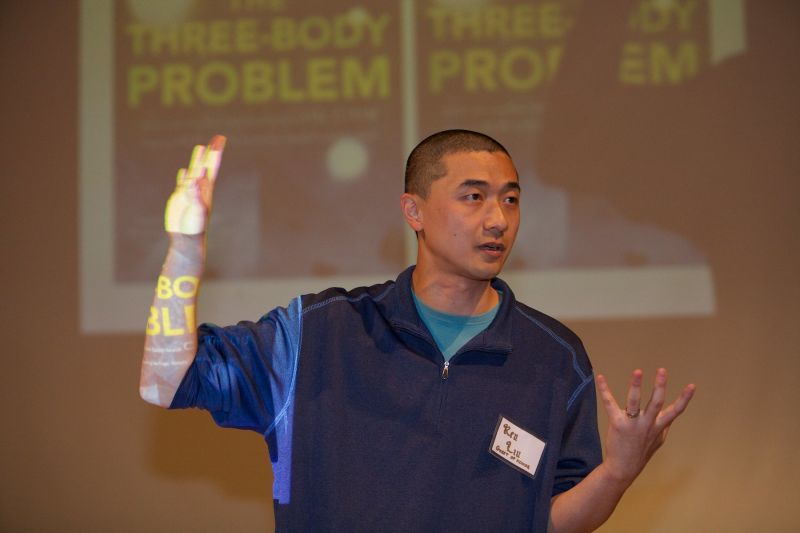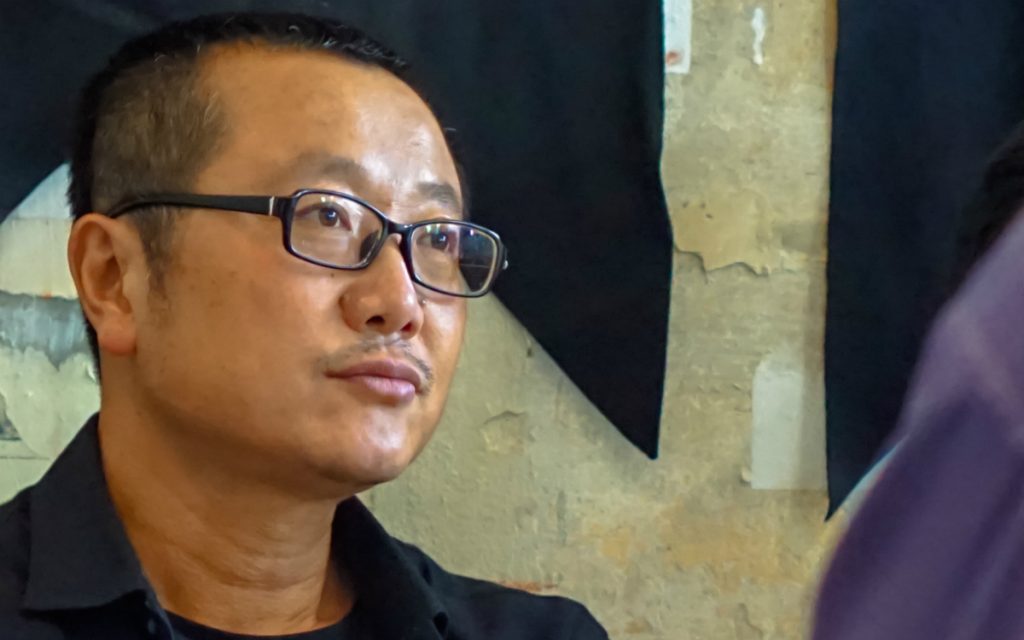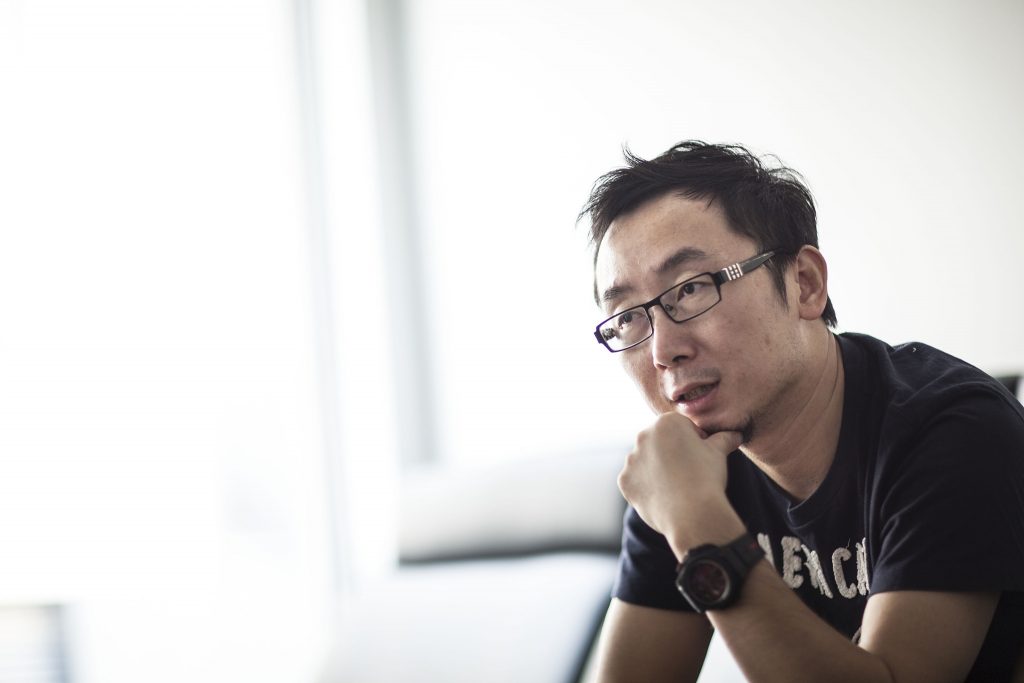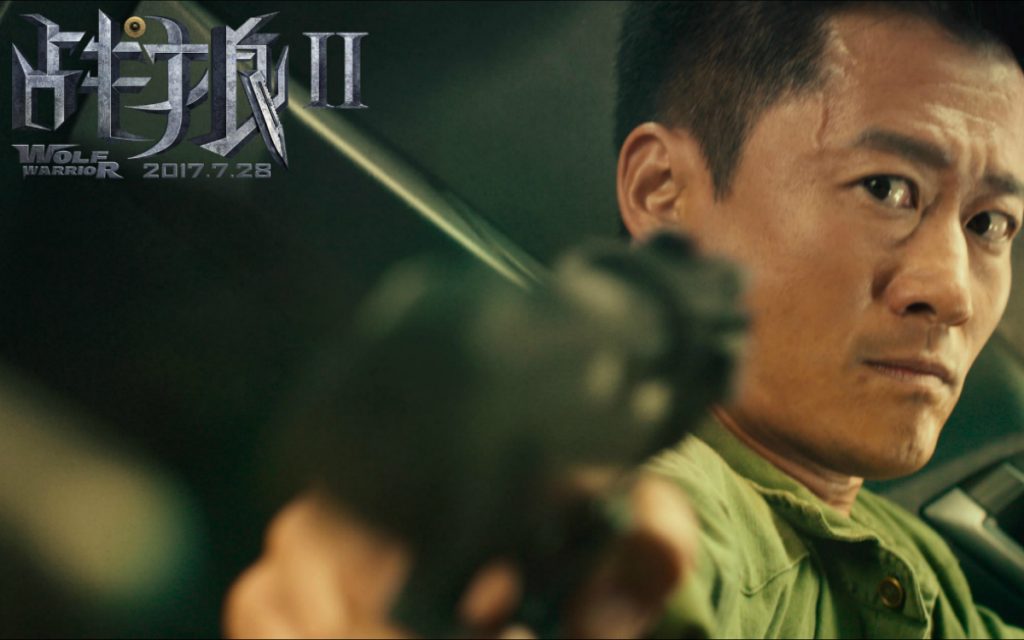While a younger generation of Chinese readers have been voraciously reading stories from around the world for decades, Chinese science fiction has barely begun to seep into Western libraries. But those that have, have done so with resounding success.

Translating Chinese novels to English has long been a way to “bridge” the cultural divide of ideas between China and the rest of the world. In one genre in particular, translations have created a supernova of discussions on the talent emanating from the Middle Kingdom. That’s science fiction. Chinese sci-fi has taken the West by storm in recent years, with Chinese authors bagging top awards including the Hugo, considered the equivalent of the Pulitzer for this genre, and former U.S. President Barack Obama adding a volume of Chinese sci-fi to his reading list.
One author in particular has been the main conduit introducing Chinese sci-fi to the world. That’s 41-year-old copyrights lawyer-turned-author-cum-translator Ken Liu.
“Everything begins with Ken Liu,” according to China’s Milky Way and Nebula Award Winning Sci-Fi writer Chen Qiufan. “Before him, there wasn’t anything. Only the mainstream novels would be translated.”
Originally from Lanzhou, a city in southwest China famous for its hand-pulled noodles, Liu has lived in the U.S. since he was 11. A graduate of Harvard University and Harvard Law School, he works in the technology litigation field. He is also a prominent science fiction writer in his own right, winning the 2012 Hugo award for best short story for his story “Paper Menagerie,” and in 2013 for “Mono No Aware.”
He shot to global prominence after one of his translations, “The Three-Body Problem” by Liu Cixin, became the first Chinese work to win a Hugo Award for Best Novel in 2015. Obama took this first volume in the “Remembering Earth” trilogy on vacation while in office, and Facebook founder Mark Zuckerberg recommended it on his personal page.
Liu, the poster child of homegrown Chinese science fiction, was again shortlisted for a Hugo for the best novel this year for his most recent work, “Death’s End,” which was translated by Ken Liu. But this year’s award, announced in Helsinki, Finland, on Aug. 11, went to U.S. writer Nora K. Jemisin for her work “The Obelisk Gate.”
As stated by National Public Radio’s Jason Heller, “Science fiction from other countries has been overlooked too long […] in the U.S., and it’s to everyone’s benefit to fix that.”
Echoing the uncertainties of the modern era, Chinese science fiction novels have struck a chord with readers of all ages and backgrounds. Their diversity in topics and settings touch on many issues related to our technology-obsessed age.
While a younger generation of Chinese readers have been voraciously reading stories from around the world for decades, Chinese science fiction has barely begun to seep into Western libraries. But those that have, have done so with resounding success.
In an email interview, Liu explains the emerging global interest in and commercial success of translating Chinese science fiction to English.
Caixin: First, how did you enter the Chinese science fiction translation industry? Was translation a hobby at first? If so, do you still see it the same way?
Liu: I had a varied career as a software engineer, entrepreneur, corporate lawyer, and then high-tech litigation consultant. I’m also a science fiction writer, with over 130 pieces of short fiction and two novels published. Many of them have won awards such as the Hugo, Nebula, and World Fantasy.
Translation is a very small part of what I do.
I was never interested in translation when I was growing my writing career. However, there’s a long tradition among writers, and especially among science fiction and fantasy (SFF) writers, to help each other find new readers whenever we can since we are all members of the same fandom — most of us were fans first before we became writers.
I got to know the work of my Chinese writer friends gradually, and a lot of it has to do with writer Chen Qiufan, who reached out to me over email to begin a lasting friendship. I read his fiction and the work of other Chinese writers and fell in love with them. Many of these stories are utterly brilliant, among the best works of fiction I’ve read.
One day, Chen Qiufan told me that he had one of his stories translated into English, and would I want to take a look at the quality of the translation? I said sure. As it turned out, the translation was competent, but it didn’t capture the most important quality in Qiufan’s writing: his inimitable voice — sardonic, erudite, witty, like a brilliant friend whose insights you want to listen to for hours. I offered to give him some suggestions on the translation, but warned him that I had no experience doing translations at all. He told me to go ahead.
I found that fixing someone else’s translation was far more difficult than just doing the translation from scratch, and so in the end I had to throw away the existing translation and do it over myself. That translation, my very first, ended up in Clarkesworld, a very well-respected magazine in the field. It was the first translated story they had ever published, and it won Qiufan and me a translation award.
That was the start of my translation efforts. I thought it would be wonderful to introduce more of my fellow Anglophone readers to these brilliant writers I so enjoyed reading, and it would be good to gain my writer friends more readers overseas. Over time, I’ve had dozens of translated stories published, and I even put out the first anthology of contemporary Chinese SF (defined as fiction written during the 21st century) in the English language. Titled “Invisible Planets,” it has been well-received in the critical literature and in the market.
Eventually, when China Educational Publications Import & Export Corp., the rights holder for Liu Cixin’s “Three Body” series, came to me to be the translator for the first volume of his masterpiece, I was very honored that my reputation had gained me the trust and credibility to undertake this task.
I still enjoy translation as a part of my service to the SFF community and to making global SF a more integrated, imaginative, thoughtful experience for all readers, but especially Anglophone readers. (We in the English-speaking world are particularly deprived of quality translations. Countries like China, Japan, Germany, Spain, etc., all publish many more translated books than we do.) However, translation is at best a side gig compared to my main career as a novelist and short-fiction writer.
How has the English science fiction reading audience changed over time?
This is hard to say, and if you ask different writers or publishers, I’m sure you’ll get very different experiences. I think it’s generally accepted that competing entertainment formats like games, comics, and film/TV have, over time, gained the vast majority of the attention share of SFF enthusiasts, but there are still plenty of readers of literary SF. I’ve heard from some American/British writers who have been to Chinese SF conventions that they thought the Chinese fans were much younger than the fans who attend American/U.K. conventions, and perhaps that meant that the demographic who reads SF in China skews younger than in the U.S. or U.K. (and other Western English-speaking countries) — and perhaps that reflects an “aging” of the SF readership in the West.
Personally, I’m averse to making such generalizations. Even if the observations about cons are true, the demographic of those who attend cons is not likely to be the same as those who read. Moreover, many works popular with younger readers are sometimes marketed in the West under genre labels such as “YA” when they’re unquestionably SFF works. So I think it’s hard to make such generalizations and claim they’re true.
I’d say that the most visible change in the genre readership is probably reflective of the change in the cultural landscape of Western countries in general: more diverse voices, more works that tackle the difficult questions of our globalized age, more works that push SF in new directions.
What are the new trends in the genre have you seen?
I’m not personally interested in detecting trends at all. They don’t help me as a reader or as a writer.
I do think that SF, like all literature, is reflective of the society and time that produces it. So the SF that is being written today reflects our anxieties and concerns: climate change, the advent of universal surveillance, the coming of ubiquitous AI (artificial intelligence), the degree to which technology as a maximizer of individual power has made the world both safer and more dangerous, etc.
What are the challenges you face as a Chinese to English translator?
Translation difficulties are rarely about language, but about culture. And translation difficulties are almost always connected to power differentials between source and target cultures. When works from a more-powerful culture are translated for the consumption of a less powerful culture (where “power” is defined in both hard and soft ways), the target readership is far more willing to adapt to the conventions of the source work and far more willing to humble themselves to learn about the source society. This is why when English works are translated into Chinese, Chinese readers have no problem with names rendered in the Western order of given name and family name, and are happy to read footnotes to explain cultural references that they’re not familiar with. Indeed, most Chinese readers are so familiar with American culture, for example, that most American works can be rendered into Chinese with few footnotes.
When translating from a less-powerful culture to a more-dominant culture, however, the reverse is true. The target readership is far more likely to be resistant to learning about the source culture, and they often expect things to be exactly the same as their own culture due to their privileged position of assumed universality. Thus, American readers often complain when I render Chinese names in the customary order of family name, given name, or when I decide that I have to drop a footnote to explain some aspect of Chinese culture that is critical to understanding. Since most American readers are not familiar with Chinese cultural references, there are many more such moments when rendering a work written in Chinese into English.
Translation is a matter of cultural negotiation, and the relative positions of cultures change over time. Japanese-English translators from decades ago faced similar problems I do now, and they had to pick and choose what aspects of Japanese culture they could explain to American audiences and what aspects to drop or domesticize for the target readership. But as Japan’s cultural prestige has risen, today’s translators face a very different dynamic. Indeed, reading a work translated from Japanese to English today, one is likely to see Japanese honorifics and many Japanese words rendered simply as Romanizations rather than translations, showing the extent to which current Anglophone reader are willing to study Japanese culture in order to understand such works.
That is obviously not the place where Chinese works are, and so we Chinese-to-English translators must continue to perform the work of cultural negotiation and lay the foundation for, hopefully, future change.
Many writers and readers, both Sinophone and Anglophone, minimize the difficulties of cultural negotiation. They seem to think that because SF is a genre invented in the West and then imported into China, Chinese SF works ought to be “universal” (meaning transparent to Western understanding) if the language is simply re-encoded into English. They’re sadly mistaken. As I stated before, all literary works, SF included, are permeated through with the cultural soil in which they take root, and the work of cultural negotiation in translation is as difficult in SF as it is in any other genre.
Finally, what are the challenges Chinese science fiction writers face in reaching an international audience these day?
When I or other writers I know write, we don’t really target some “international audience.” I write for an ideal audience that is basically me, and I care very little about “universality” or the “lowest common denominator.” I doubt most Chinese writers are writing for some imaginary international audience either — writers write first for themselves, and then for readers who can resonate with the beating heart of their narrative.
Yet it is precisely by being local that one can achieve the universal. I’m a firm believer that the more you try to write a work that is dense, rich, allusive, and embedded in the fabric of the complicated cultural conversation around the writer, the more likely it is that the work will reach a global audience. So I would say that writers should always write works they love and not worry about international marketability. That will happen as a secondary effect of a work that is truly loved.
— This article originally appeared on Caixin Global.











